Discussing The History Of Censorship In Media And Literature
The Temptation Brought About by Taboo
Just as Adam and Eve in the Garden of Eden became fixated by the fruit of the one tree they were told not to touch, the swiftest means of enhancing appeal of anything is to place it beyond the permitted.
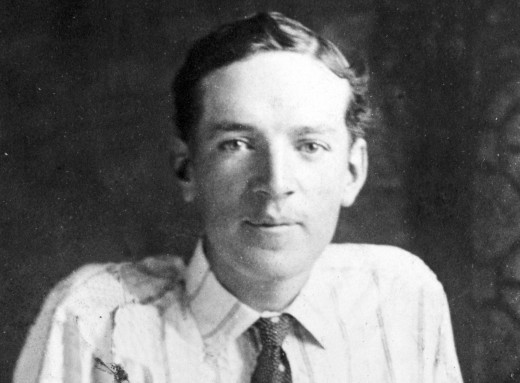
The same is true of books, films and other art forms. Boston, called “The hub”, and capital of Massachusetts, was a respected and conservative city founded by the censorious puritans. During the 18th and 19th century Boston was famous for banning books, art and films. Hence the phrase "Banned in Boston" which often enhanced the promotion and value of the offending material. This knowledge prompted novelist Upton Sinclair to write in a letter that he would prefer to have his books banned in Boston rather than anywhere else, as his readership would then be likely to soar in every other area.
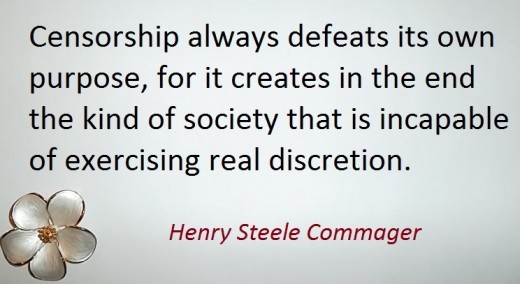
The Censor as Literary Bully
Teacher Azar Nafisi recounts an intriguing interchange between two students, during a discussion of F. Scott Fitzgerald’s novel, “The Great Gatsby”. One student asked why the main character, Gatsby, squanders most of his life pining for the largely elusive Daisy Buchanan. A fellow student responded, “Why don't you write your own novel?”
A similar query could be addressed to those who feel justified in purging works, written by the deceased, of words or concepts of which they believe society should or does disapprove. Though many classics are viewed as immortal, their mortal authors are defenseless against interference.
This leads to the question as to what impels anyone to take on this position. When asked, as a child, what they hope to become as grown-ups, in all probability, no child has ever replied, “I would like to be a censor.” Yet, a fairly large number of people have become self-proclaimed or officially appointed arbiters of what is appropriate for the public to hear or view.
One cannot help wondering if those who voluntarily choose to purify renowned masterpieces are fuelled, to some degree, by the wish to leave their imprint on works they know to be leagues beyond their own penultimate efforts. Two censors discussed below, succeeded, though in a negative way, in gaining some recognition in that their names have been incorporated into the English lexicon.

Thomas Bowdler: Viewed as a Prig And Killjoy
Born in 1754 in England, Bowdler was the youngest of six children. As a young man, having studied medicine he received his medical degree in 1776. He later gave up medicine due to ill health and devoted his time to prison reform. Later, perhaps due to a wish for a more sedentary lifestyle he took up writing. Among his many works were the rewritten versions of Shakespeare’s plays. Deeming himself an authority on appropriate reading material these censored versions (The Family Shakespeare) were published in 1807 and deemed suitable for reading by women and children.
Having done all he could to purify Shakespeare, Bowdler decided to cleanse Edward Gibbon's monumental “Decline and Fall of the Roman Empire”, to suit his own ideals of propriety. If this distorted history, it at least shielded the human mind from pathways of licentiousness. This revised edition was published in 1826, the year after Bowdler's death in 1825. During the decades since his demise, the word “Bowdlerize” has come to indicate dreary, tedious reading.
Anthony Comstock: Bowdler’s American Counterpart
Comstock, famous for his crusade against immorality, was influential in bringing about the eponymous 1873 Comstock Law. This law effectively banned anything deemed obscene.
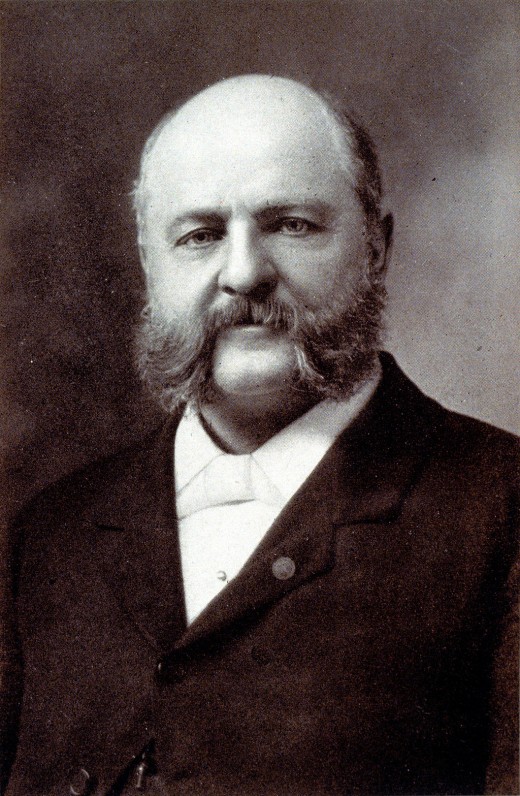
The Campaign For The Suppression of Vice
Comstock’s sense of propriety first manifested itself during his military service during the American Civil War. He felt appalled by the coarse language often used by his fellow soldiers. Following service he joined the (YMCA) The Young Men's Christian Association and in 1873 founded the New York Society for the Suppression of Vice; its purpose was to supervise public morality.
In all likelihood, the widening reputation of Boston Massachusetts for upholding principles akin to his own, urged him to found a branch of the society there. In 1878 Comstock gave a speech at the Boston Park Street Church which aided the creation of the New England Branch of the Society later to become the Watch and Ward Society. The members of committees enlisted to run this new branch were all prominent and influential men.
Ironically, about 450 men attended Comstock’s speech; women however were banned from entering the church. The pretext for this exclusion lay in the chivalrous wish to shield ladies’ fragile ears and souls from the taint of the upcoming discussion. In reality, it prevented women from having the slightest input into male decisions which were bound to impact upon those materials they would be allowed to read, hear or watch.
Nowadays the censorship of literature and performance is often referred to as Comstockery.

Defiance of Dogmatists, Beginning With Poet Walt Whitman
Like many writers whose names have long been a part of the literary pantheon, poet Walt Whitman began to be recognized only after he published his work, “Leaves of Grass” at his own expense. While his talent was admired by many, opposition by moralists to certain words and passages considered erotic had curtailed distribution of his poems. Thus, Whitman was delighted when Boston publisher James Osgood offered to compile all Whitman’s work in one well-presented volume. Still, while delighted by this offer, Whitman insisted on a complete version, without one word deleted.
Still, akin to many writers, eventually his zeal to be published urged him to agree to several changes. However, pressure from the New England Society for the Suppression of Vice caused Osgood to insist on further censoring that being removal and changes of many poems. Whitman refused and approached a less renowned publishing house, “Rees Welsh & Company” which allowed him more freedom, publishing his works in 1882.
While many moralists condemned “Leaves of Grass”, one writer for the Boston Globe defended Whitman by stating, if works such as his were to be viewed as too impure for public consumption, all the classics, including Shakespeare’s masterpieces, should be consigned to the sordid underworld of social contempt. Even the Bible could not withstand this depth and degree of scrutiny.

In Defense of “Forever Amber”
Controversies such as those aroused by “Lady Chatterley’s Lover” by D. H. Lawrence and “Ulysses” by James Joyce have been so publicized as to make commentary here extraneous. I prefer to write of Kathleen Winsor’s 1944 novel “Forever Amber”, largely because I found it to be one of the most fun and fulfilling reads of my life. True, I began to read it due to my having been told not to do so. Still, I continued to find it enthralling in that it proved to be a tapestry of delights. To my surprise, one of its major joys lay in its historical framework.
Its author, Kathleen Winsor was born October 1919 and died May 2003. While a student at Berkeley California, she married a fellow student with a passion in English history. Glancing through the books he was reading on King Charles II, Ms. Winsor, (retaining her maiden name as a writer), decided to write the novel, “Forever Amber” which was published shortly after her 25th Birthday. Though somewhat lewd for its time, it has since been acknowledged by the finest scholars of that era as magnificent in its attention to historical detail.
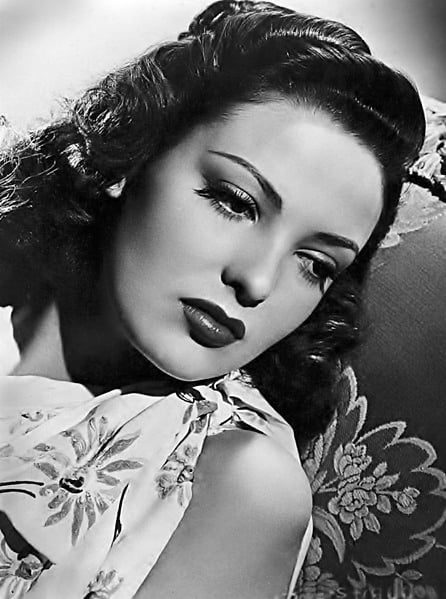
Still, as might have been expected, The Boston Watch and Ward Society concerned only with seeking out the salacious went into battle against its sale and distribution. Though this campaign enjoyed a brief triumph in halting sales in Boston and other areas of Massachusetts, “Forever Amber” simply sold too well to succumb, over all, to censorious rigors.
During WWII, with America frantic to sell war bonds, (a type of savings bond to be redeemed after the war was over), found the well of this novel’s purchasing power almost depthless. One copy autographed by Ms. Winsor was bought at one million and seventy-five thousand dollars in war bonds. (My dad, a marine during WWII, later told me the book was passed from hand to hand on his ship, akin to contraband.)
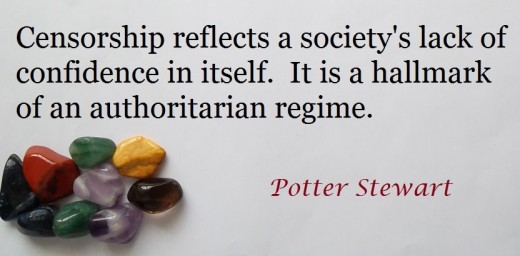
The Hays Office: 38 Years of Power Over The Filmmaking Industry
In 1930, scandals involving celebrities, combined with increasing public absorption with films, impelled conservatives to create a moral code. The title “The Hays office” sprung from William W. Hays, the man appointed to determine standards of decency for public viewing. From 1934-1954, Hays deputed most of his power to Joseph Breen. Hence, Breen decreed what content was appropriate for exposure to the American public.
After 1954, with the approach of the 1960s and the growing prevalence of television, the strength of this office began to decline. By 1968, at the height of Vietnam protests and ultra-radicalism, the original strictures of the Hays code had become antiquated and rusted.

The “Dos" And “Don'ts” of The Hays Office
The list of the objectionable, in terms of this code, clashes with our current mores to the point of being inane and pointless. A few of its constraints are still relevant: desecration of the American flag and films encouraging prostitution and substance abuse continue to be valid in terms of their negative influence upon developing minds. Still, other such strictures have become nonsensical. By way of example the passion between two people, and the proximity of a bed, the foot of one party needed to be shown to stay on the floor as a symbol of resolute chastity.
Two other prohibited subjects, cancer and homosexuality, were to haunt then cutting edge playwright Tennessee Williams, when his stage version of “Cat on a Hot Tin Roof” was being made into a 1958 film. Its plot hinges largely upon the interweaving of these two subjects. While some critics have claimed the elimination of direct language regarding these issues rendered the film confusing, I have found the uncensored version somewhat crude and lacking the subtlety conveyed by the movie.
Seven years earlier, Tennessee Williams had been confronted by a similar issue regarding rape in one of his major works.
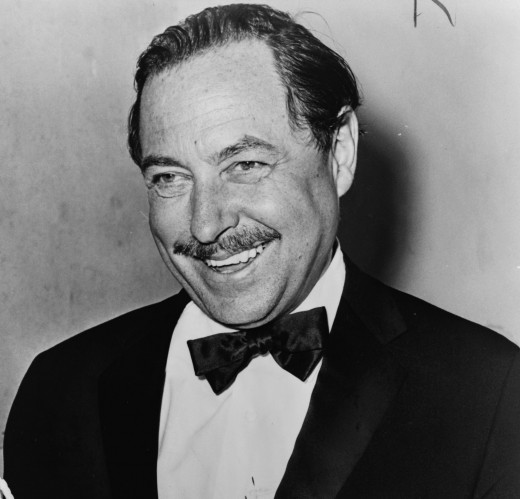
Tennessee Williams’ Plea For Artistic Liberty
When Elia Kazan directed Tennessee Williams’ 1947 and Pulitzer Prize winning play, “A Streetcar Named Desire”, both Kazan and Williams realized the struggle ahead to comply with the rules of the Hays office, the arbiter of acceptability in American films. To encapsulate its ending, a woman on the edge of a nervous collapse is raped by her brother-in-law.
Kazan, alarmed by the constraints of the Hays Office, felt impelled to ask Williams to remove this scene. Shortly before its 1951 film presentation, Tennessee Williams sent Kazan a letter containing the plea of countless writers, feeling strangled by the censorship noose. As he pointed out, he had made a number of concessions from his stage play in order to conform to the Hays Office parameters. Its central purpose, he stated, was the erosion and destruction of beauty and vulnerability by ruthlessness. This scene was retained.
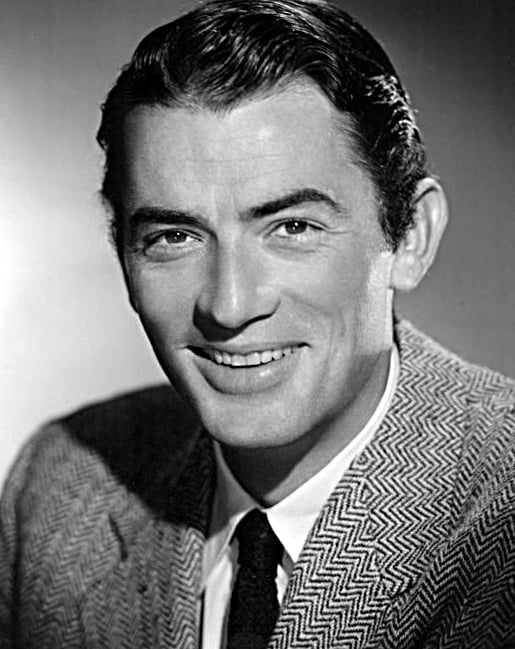
Ways of Outwitting The Hays Office Censors
Even the most determined censors found difficulty in banning scenes from films based on Biblical episodes. Hence, material unacceptable in other scenarios proved harder to delete if the liaisons depicted could be linked to scriptural passages. As has often been pointed out, there is more eroticism in the Old and New Testaments of the Christian Bible than in many books damned by the self-righteous and sanctified.
Apparently, the bible story, subject of the 1951, 20th Century Fox film, “David and Bathsheba”, directed by Henry King and starring Gregory Peck and Susan Hayward stretched the boundaries allowed almost beyond elasticity. Indeed, the plot was provided by the history of King David’s passion for the married Bathsheba. Ultimately, the king orders her husband’s slaying by assigning him to stand in the front line of a battlefield, during hand-to-hand slaughter.
Evil Could be Shown if The Wrongdoer Was Suitably Punished
Aware that audiences would tend to be drawn to a film by its villains of either gender, these characters could be portrayed, as long as in the end they died consequent to their misdeeds, wound up imprisoned for lengthy terms, or at least felt plagued by shame and remorse.
At times, we, the audience, can almost hear the undertone, “We both know I don’t mean this, but I am obliged to say it anyway” Hence, in the United Artists 1959 film “Happy Anniversary”, the husband, Chris Walters played by David Niven, after fourteen years of marriage, admits to his parents-in-law his having taken their daughter to a hotel before they were married. Denied the seal of approval, the actor says in a voice-over, off screen, just prior to the end of the movie, how foolish he was to have done such a thing, and his shame at having done so.
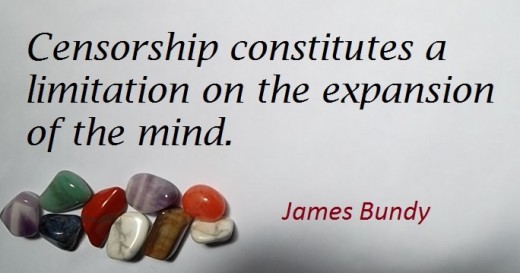
Returning to the above-mentioned “Forever Amber”, before the film begins, it is introduced on the screen as the tragic story of a village girl, seduced by an aristocrat, then, slowly, to her lasting sorrow, is drawn into ruination due to promiscuity. In fact, Amber enjoys quite a romp, during an era when pleasure was in abundance for those with enough wealth and duty to share in its cornucopia. Still, in order to comply with requirements, the audience is ostensibly urged to perceive her as an exploited maiden.
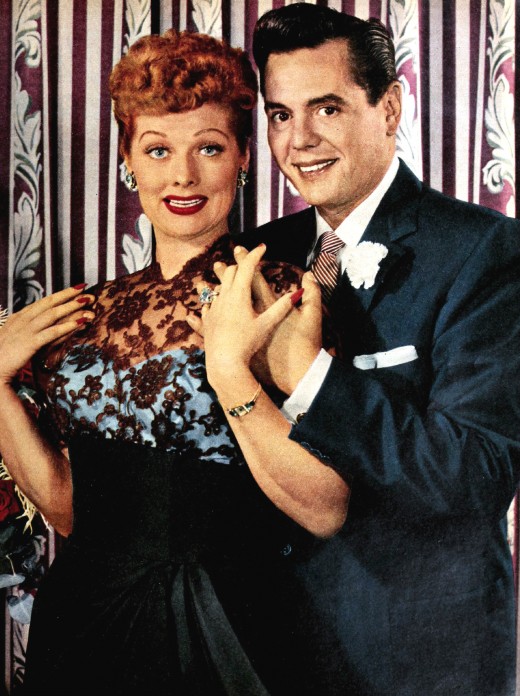
Controversy Regarding The “I Love Lucy” Show
The I love Lucy show was a televised American sitcom that ran from 1951 to 1960. Today, it seems almost laughable to read of the concern brought about before the airing of the December 1952 show. The star of the show Lucille Ball had become pregnant and whilst her pregnancy would be incorporated into the storyline, CBS television would not allow the word “Pregnant” to be used because they considered it vulgar. Instead they wished to use the word “expecting”. CBS appointed a panel consisting of a priest, a minister and a rabbi to advise on how to convey this to the public. It was decided to air a printed message on the screen, “Lucy is expecting”. Even then, perhaps in an attempt to evoke a sense of distance and elegance they aired the message in French “Lucy Is Enceinte”
Please enter the poll
Do you believe the rules governing censorship should be more lenient?
To What Extent Should Individuals Agree to Conform to Censorship?
Some twenty-five years ago, I knew a young comedy writer and performer who moved to Los Angeles in order to audition at several major comedy clubs. His talent, combined with his ability to interact with the audience, resulted in one club owner offering him a regular, well-paid slot on their roster. As this club had a family ambiance, the owner’s sole request was the deletion of a few obscene words.
Despite awareness these words were by no means central to his work, my friend refused on the basis that he would not allow his material to be censored. At the time, I ached to remind him that nearly everyone, especially in that competitive area, must make initial concessions.
Through the years, having heard nothing regarding what could have easily been his career, and finding not even his name on the internet, I have wondered whether he ever regretted his perceived integrity. Given our youthful ideals and defiance, we sometimes learn the value of compromise when we are no longer in a position to do so.

© 2015 Colleen Swan






